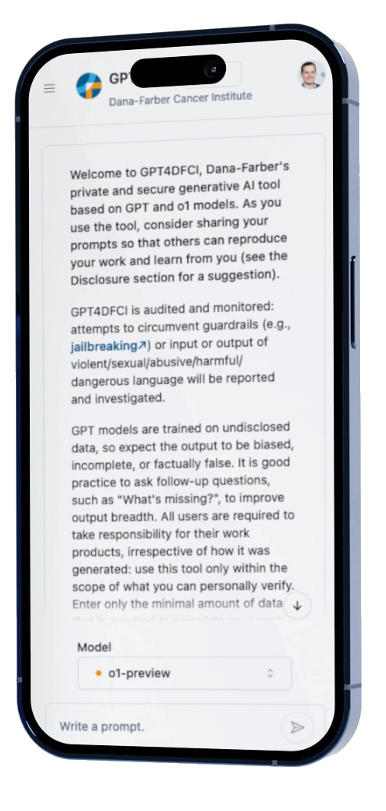Mission statement
The Artificial Intelligence Operations and Data Science Services (AIOS) team advances DFCI and I&A missions by:
- Bridge the gap between Research and the Clinic by designing, implementing, and deploying artificial intelligence (AI) and data science solutions for the Institute
- Assist DFCI faculty by providing customized AI and data science support in laboratories, centers, and departments
Services
Support Model: Our approach is to deploy personnel that best suit your needs and evolve as your needs evolve, across our multidisciplinary team members, as well as engaging collaboratively with other groups. We usually engage in a longer-term commitment (e.g., 12 months or more) of at least 100% of an FTE to develop a long-term relationship across projects and needs.
Primary Services and Offering:
- Custom GPT deployments based on GPT4DFCI, a private, secure, HIPAA-compliant generative AI tool, based on GPT and o1 models, that is deployed at DFCI for non-clinical use. These custom GPTs allow you to add your data to it, eliminating hallucinations and allowing your team to "talk to your documents"
- Artificial intelligence, data science, machine learning (ML), automated ML, multi-modal ML, self-supervised learning, federated learning
- Large language models & natural language processing (e.g., text as main input data modality)
- Computer vision on image data from pathology, radiology, and radiation oncology (e.g., pathology slide images such as H&Es, whole-slide images, tissue-micro arrays, and radiology/radiation oncology imaging studies such as MRI, CT and other imaging modalities)
- Machine learning operations (MLOps) and ML production deployment (i.e., large scale, reproducible, and hybrid/multi-cloud deployments)
- Cloud innovation & AI strategy
- AI & machine learning enablement: building the data pipelines, software libraries, and data pre-processing tools, that aim at lowering the barrier of entrance for researchers who want to transition from "X" to "AI-powered X" in the context of cancer research
- Client management (in partnership with other I&A client service areas)
For examples of current/past projects, please see:
Project highlight
GPT4DFCI, a private, secure, HIPAA-compliant generative AI tool based on GPT and o1 models, is now available to Dana-Farber workforce members to try out for work purposes, excluding clinical care
To request access:
- If working remotely, be sure you're connected to VPN.
- Visit the Informatics & Analytics GPT4DFCI sign-up page.
- Log in with your MGB username and password.
- Complete and submit the ticket.
- Once your access is granted, visit https://gpt4dfci.dfci.harvard.edu
Please review Dana-Farber’s new policy on acceptable use of generative AI. Workforce members are required to use generative AI systems in a manner that maintains the protection of protected health information (PHI), personally identifiable information (PII), and other confidential information. It also must be used in a manner that maintains the integrity required for scientific analysis as well as generation of scientific content such as text, images, graphics, and figures.
Please remember, publicly available AI tools can pose significant privacy and security risks. For this reason, only Dana-Farber-approved AI tools can be used for work purposes.


Additional information
Related services at DFCI: the Dana-Farber/Harvard Cancer Center includes the Biostatistics Core whose members (see list on that page) can assist with data-driven research. The Biostatistics Core is run by the Department of Data Sciences at DFCI, which also houses other computational scientists that are open to collaborations (see list on dept page). The Survey and Data Management Core provides survey data collection and management services.
